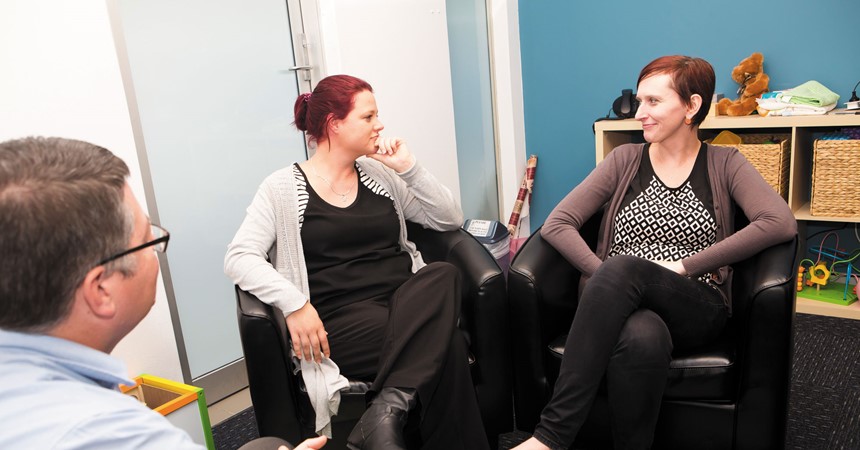Family Dispute Resolution (FDR) also known as family mediation, offers a practical and cost-effective way for separating families to sort out these arrangements. The FDR practitioner can help by assisting communication between the parents, facilitating discussion of issues, looking at options and documenting agreements. The family law system mandates that separating parents attempt Family Dispute Resolution before going to Court. Aurora spoke with one of CatholicCare’s FDR practitioners, Anjali Rastogi, about FDR and how it can help those in need. Anjali is a solicitor, a Family Dispute Resolution Practitioner registered with the Attorney-General’s office and a Nationally Accredited Mediator.
What is Family Dispute Resolution?
Family Dispute Resolution (FDR) is a process whereby separated couples are assisted by a specially qualified practitioner to discuss their issues in a safe and non-threatening environment with a focus on the best interests of the children and minimising conflict. Agreements can be reached regarding the children’s future living and ‘spending time with’ arrangements including, but not limited to, hours of care, mode of transport and travel of children, education and extra-curricular specifications, arrangements around special occasions and access to medical records and school reports.
What should prospective clients expect?
FDR commences with each party having a private session with the practitioner to gain information about the process, get to know the mediator, discuss his or her specific needs and concerns, identify possible obstacles to mediation and determine the best way to conduct the mediation.
Following the initial private sessions, the FDR is scheduled to occur at a mutually suitable time.
Mediations can be conducted with the parties either as a direct negotiation with each other, a shuttle negotiation where the FDR negotiates on behalf of the parties, or a combination. The practitioner assists the parties to explore family issues in an objective manner, focus on the needs and best interests of the children, generate and ‘reality test’ options, resolve specific disputes and document any agreements reached in a Parenting Plan.
It is important that clients are aware that FDR practitioners are impartial and do not take sides.
The mediation is conducted in a business-like manner and focuses on courtesy and communication between both parties. Unlike counselling, FDR does not focus on the emotional side of relationships, but rather, the future needs of the children and parents.
What happens to any agreement reached at FDR?
Any agreement reached at mediation can be recorded by the practitioner in a Parenting Plan which is signed by both parents. The agreement can include mechanisms to change arrangements and resolve disagreements. Parenting plans can be renegotiated over time, if necessary.
To make the Parenting Plan legally binding, the parties can then apply to the court to have the agreement made into a consent order. This can be done by the parties or with the assistance of a lawyer.
What are the benefits of mediation?
Mediation is a self-directed, confidential and empowering process that enables clients to voice their concerns, issues and ideas in a non-threatening environment. It can be an immensely satisfying and rewarding process and highly beneficial for the children.
How do you customise your services?
The style of communication during the session is customised according to the needs and wants of clients. We understand that some separated parents are not comfortable being in the same room. This is not an obstacle to mediation as successful communication can be facilitated by the mediator with the parties in separate rooms. Alternatively, parties may commence mediation in the same room and then choose to continue discussions from different spaces. We provide an environment for communication that suits the parties’ individual and changing needs.
Who can attend?
The people having the disagreement need to be involved in the FDR process. If needed, support persons can also attend. FDR is not limited to separating parents. Mediations can also be conducted between parents and grandparents, foster parents and birth parents and significant adults in a child’s life.
Do you ever not reach an agreement between parties?
For some couples, coming to an agreement can be a lengthy process and ultimately not something that either party can agree to in a FDR setting. Where no agreement is possible, a registered FDR practitioner can provide the parties with a 60I certificate. A 60I certificate is a legislated prerequisite to court proceedings in most cases.
Does FDR include counselling or legal advice?
FDR practitioners are not counsellors and do not provide legal advice. Clients engaged in FDR are encouraged to seek their own legal advice. CatholicCare Social Services can provide counselling sessions to one or both parties. However, counselling is not part of the FDR process.
About CatholicCare’s Family Dispute Resolution
CatholicCare’s Family Dispute Resolution Practitioners are fully accredited by the Commonwealth Attorney General’s Department under the Family Law Act 1975 and are skilled practitioners with extensive experience.
Sessions are confidential and are privileged under the Family Law Act 1975. Exceptions to confidentiality apply if there are concerns about a child’s physical or psychological welfare, or threats made to any person or property.
CatholicCare Social Services can offer appointment times outside business hours if required. Fees are based on your income and an hourly rate applies. CatholicCare’s aim is to provide an affordable and timely FDR service. Contact us for up to date information about our current fees.
Please P 4979 1172 or E counselling@catholiccare.org.au.























































































